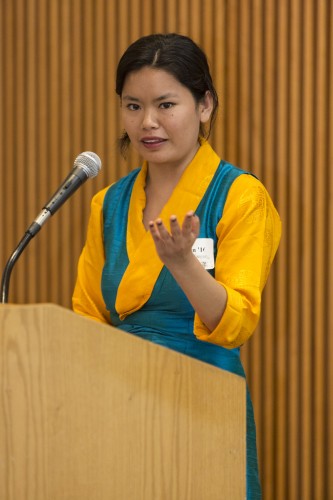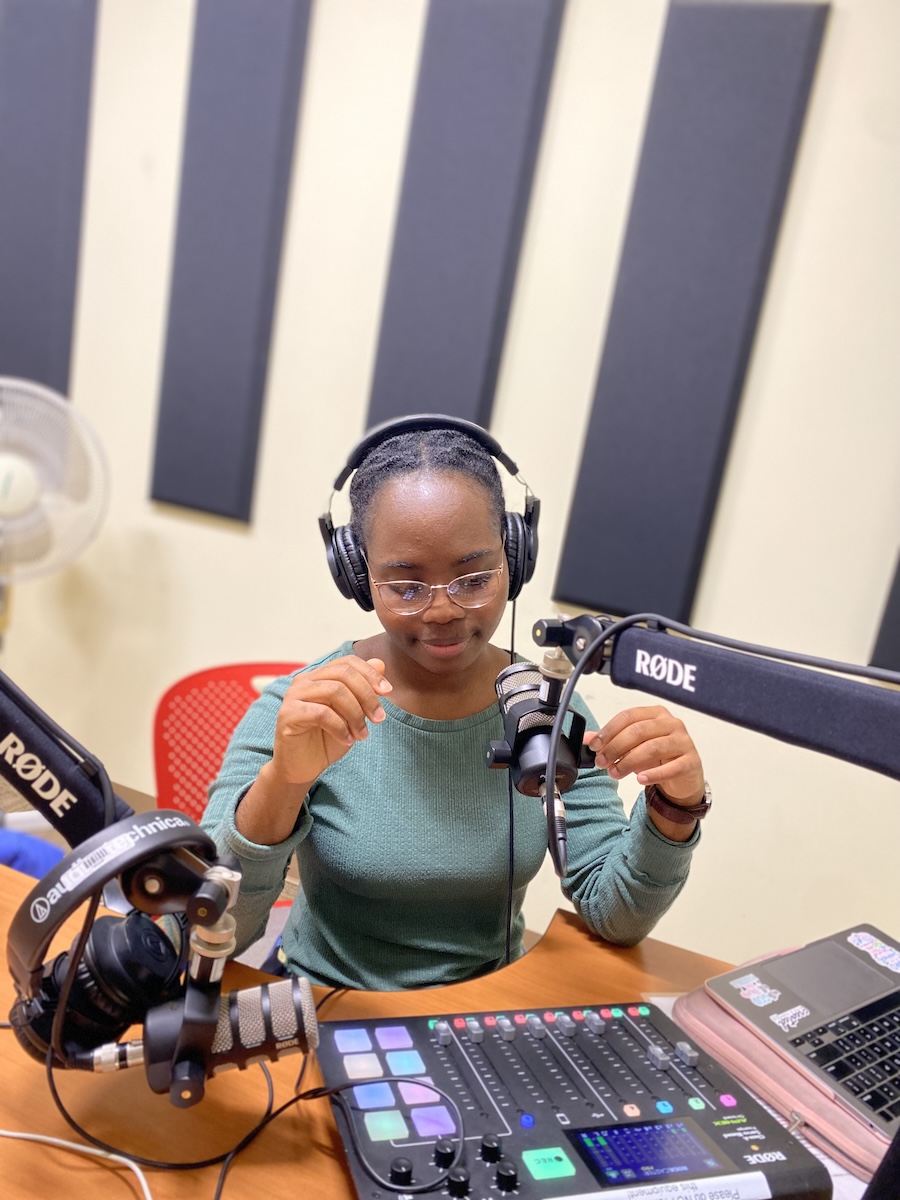Scholarship Appreciation Luncheon 2016 Student Address: Tenzin Tsagong '16
By Doug CookTenzin Tsagong ’16 delivered the student address at the Scholarship Appreciation Luncheon held May 12, 2016, in Thorne Hall.
Hello, Good afternoon everyone, donors, President Rose, friends, classmates. And to Pala, Amala, and Jhola, Tashi Delek. I am honored and flattered to be standing in front of so many people I respect and admire. All of you have tremendously shaped my Bowdoin experience. Most importantly, I am grateful that my family is able to join me on this occasion; this speech is dedicated to them. Anything I’ve achieved, including the degree with which I will be leaving Bowdoin in a few weeks is as much theirs as it is mine, if not more.

This past fall break back home in New York, I attended a lecture at the New School with Black feminist and intellectual, bell hooks. Throughout the weeklong series and conversation on race and gender, one of hooks’ remarks resonated with me personally: illiteracy, not police brutality, was the greatest threat to the black community. hooks cited that, statistically, black males are the most illiterate group in America. hooks eloquently remarked on the precarious existence that illiteracy forces an individual to occupy, an existence that makes even the ordinariness of everyday life difficult. To be an illiterate person but live in a world that is mediated through and organized around language, both spoken and written, is a life of struggle, of exile, as it forces you to live outside of that mainstream culture. At this moment, just as hooks likened illiteracy to a life of exile, I could not help but instinctively consider and reflect on my own parents’ experiences in America and their lack of access to formal education. I more specifically thought about my father, whose own struggles with English has forced him into a double exile, the first being political exile following China’s occupation of Tibet, and the second being a cultural exile imposed on him by his limited ability to communicate in a language that he should never have had to learn in the first place.
We often take language and our ability to communicate through this medium for granted. Language is a given. Yet, it does so much as it can be both inclusionary and exclusionary. On the one hand, it permits us to build relationships and communities that transcend differences. At Bowdoin, we all come together to build a shared community and culture around a common language and value like the Common Good, the liberal arts, and the Offer that we hope can help transcend differences of race, ethnicity, class, and sexuality. On the other hand, however, language can exclude, too, as it is an apt indicator of one’s social status, education, and social and economic capital. This is noticeable through one’s accent, incorrect speech, or grammar. My father’s inability to speak English marks his otherness, and moreover excludes him from fully participating in mainstream society. His broken English limits him to relationships within the family and with other Tibetans whom he can communicate with. It is ironic that even this speech that I have prepared for today, which is dedicated to them, they won’t be able to fully understand.
At Bowdoin, I have accumulated a wealth of opportunities and social capital. Bowdoin has provided me with an excellent liberal arts education that has exposed me to issues of inequality, race, intersectionality, capitalism, and to great philosophers such as Rousseau, Nietzsche, and Marx. Outside of the class, I have also taken advantage of amazing opportunities to pursue a funded internship in India to work with marginalized Tibetan women in the exile community, study abroad in China and travel to Tibet. Bowdoin, this small liberal arts college in Maine, has oddly enough allowed me to connect with my Tibetan heritage more intimately and profoundly. Yet, this deeply intellectually engaging liberal arts education that I have received at Bowdoin, which is supposed to be the expression and activation of freedom, has paradoxically also felt alienating. While it has equipped me with this language that I use to communicate with friends, classmates, and professors, it also alienates me from my own family as it further marks the difference between me and my parents, a difference that is only exacerbated by my own personal struggle to communicate thoroughly in my native language of Tibetan. Bowdoin has thus sometimes felt like a solitary, individualistic experience and pursuit, one that I can’t always fully share and involve my family in. How do I talk about classes that I am in? The issues that are relevant on campus, social life at Bowdoin? Maybe I should have made more of a concerted effort to include my parents. However, this is often difficult due to linguistic challenges on both parts: my lack of ability to communicate these experiences in Tibetan and their inability to understand this in English.
Upward mobility is not a path devoid of challenges. As much as we would like to believe that constructing a community at Bowdoin dissolves racial, socioeconomic, and ethnic differences, this is often not the case. If anything, recent events on campus this year has proved otherwise. The beginning of our Bowdoin career does not guarantee a blank slate. Instead, our embodied experience and identities manifest themselves in other ways on campus.
Language, however, also has an enormous power to liberate. It can be an act of freedom. Having access to a sociological language and imagination helps me make sense of and organize my own history. I trace the beginning of my life back to a movement–my father’s escape from Tibet, when he and many other Tibetans tread across the Himalayas into Nepal, where they became part of and helped contribute to a vibrant and resilient Tibetan-exile community in Kathmandu, a place I grew up and called home for nine years. Language allows me to perform my own interventions in this familial and collective history, in my family’s movement from Tibet to New York, in our layered marginalization, and in the larger politics of belonging. While my Bowdoin education and experience with upward mobility has caused a rupture with these roots, this distance can in itself be transformative and liberating. British-Indian author Salman Rushdie gives voice to the dual nature of cultural roots. He writes, “We know the force of gravity, but not its origins; and to explain why we become attached to our birthplaces we pretend that we are trees and speak of roots. Look under your feet. You will not find gnarled growths sprouting through the soles. Roots, I sometimes think, are a conservative myth, designed to keep us in places.” While migration itself can provoke a sense of rootlessness, of being caught in the in-between, this diasporic consciousness also generates new pathways of identity. Yet roots are still foundational in the way I understand myself and my identity, which is deeply embedded in my family’s and a larger collective Tibetan history. And as I prepare for graduation, Bowdoin will soon be part of this network of roots, anchoring forces that both ground me and open up new possibilities and imagination. Thank you.



